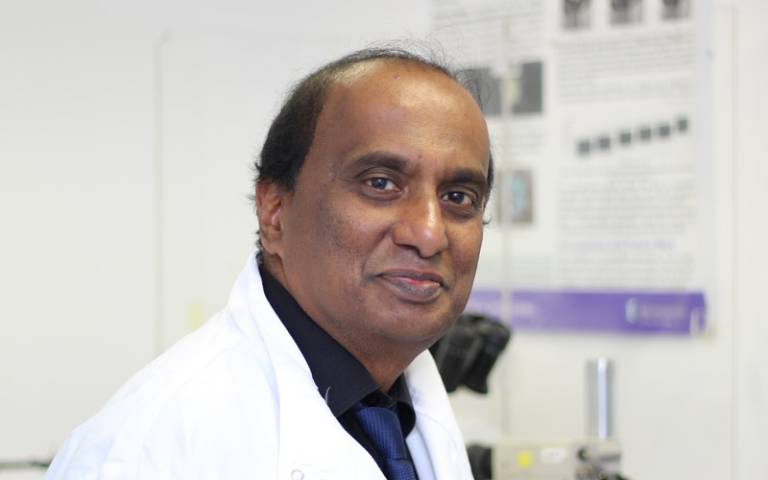Biomaterials processing expert wins Royal Academy of Engineering award
9 June 2023
Congratulations to Professor Mohan Edirisinghe OBE FREng, the Bonfield Chair of Biomaterials at UCL Mechanical Engineering, who is to be awarded the Royal Academy of Engineering’s Colin Campbell Mitchell Award 2023.

The annual award goes to an engineer, or small team of engineers, who have made an outstanding contribution to the advancement of any field of UK engineering.
Professor Edirisinghe, who leads UCL Engineering’s Biomaterials Processing Lab, is recognised for his world-leading contribution to the industrial application of polymeric fibres by inventing novel fibre manufacturing vessels and processes. He has pioneered a process called pressurised gyration, which can simultaneously combine flow rate, applied pressure and rotation speed and is applicable to all types of polymers worldwide.
This low-cost, minimal maintenance technology can be mass produced and manufactured at a global scale for specific applications in many engineering domains, enabling smart fibre to be made in a more sustainable way without the high-voltage electric fields used in electrospinning. These core-sheath fibres are particularly useful in healthcare, where the core provides mechanical integrity while the sheath contains active ingredients. Applications for these sheaths include creating materials which could help combat antimicrobial resistance.
During the early stages of the Covid-19 pandemic, Professor Edirisinghe conducted research in response to a call from the Royal Academy of Engineering to test proposals for the design and development of a new respirator mask that could protect users across the world.
The research outputs from this work on antiviral face masks was sent to the Scientific Advisory Group for Emergencies (SAGE) and the World Health Organisation (WHO). Since then, work has advanced into larger scale production of multi-layered fibres in efforts supported by the Government of Kuwait.
Professor Edirisinghe and his team have also worked with microbiologists, hospitals and industry to develop a new generation of hospital water and air filters with wider application in schools, care homes and on public transport.
Professor Edirisinghe (UCL Mechanical Engineering) said: “I am honoured to receive this prestigious award from the Academy, which is the culmination of 10 years developing the process of pressurised gyration and scalable manufacturing vessels with my colleagues at UCL and collaborating with the international research community mainly in Kuwait, Turkey, USA, and China.
“At UCL Mechanical Engineering there are at least 20 PhD students and postdoctoral researchers, who have given me excellent support and six more are currently working on pressurised gyration producing new ideas. The pandemic reinforced how vital it is to be able to deliver the right healthcare technology as cheaply as possible. What is most important is collaborating with the clinicians to ensure that patients and the public benefit, particularly in developing countries.”
Supporting Professor Edirisinghe’s nomination, Professor Serena Best CBE FREng, Professor of Material Science at the University of Cambridge, said: “Professor Edirisinghe’s work on mass production and manufacturing of smart fibres over the last decade, and especially in the last four years, has had significant impact on the healthcare industry. The breadth of target applications and strength of the underpinning research brings this crucially important facet of engineering and technology development to a completely new level.”
Links
Media contact
Dr Matt Midgley
E: m.midgley [at] ucl.ac.uk
 Close
Close

